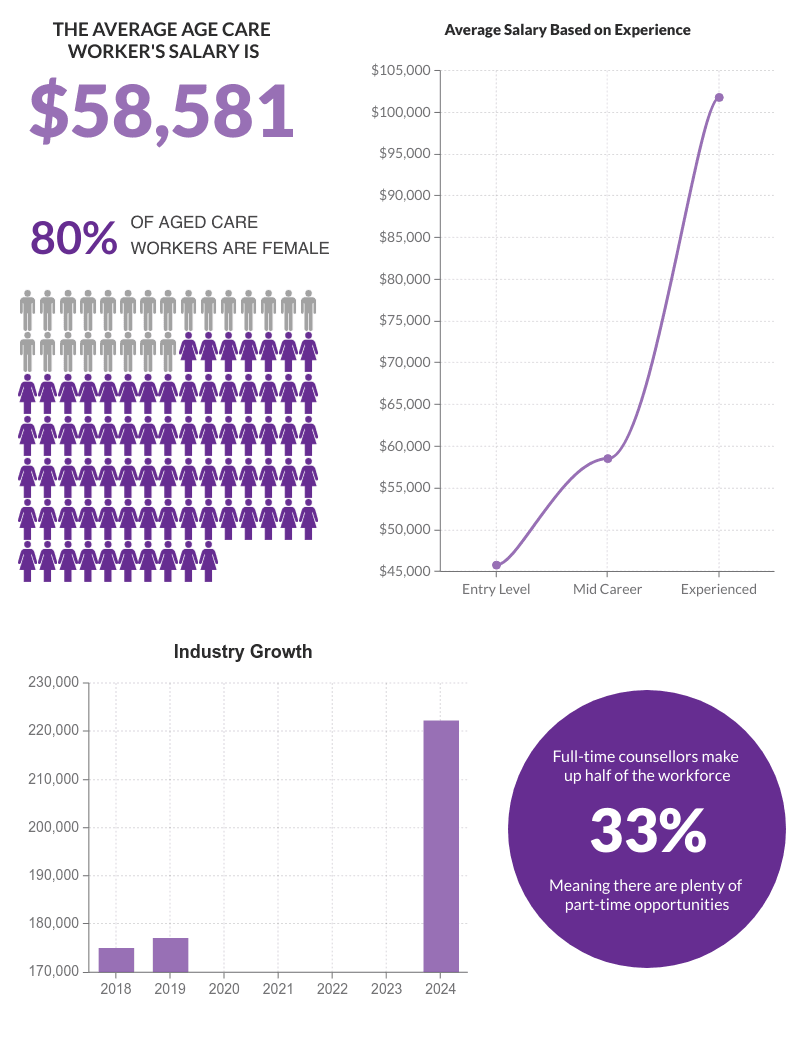More than Physical Support: A Realistic Look at Aged Care Worker Duties and Skills

In this post Show
Working in aged care is a caring, impactful career choice that involves working with elderly populations to offer them support. It requires specific soft and technical skills and workers must be prepared to undertake a wide range of responsibilities. At the end of the day, your skills and passion will see you making a momentous difference to the wellbeing, happiness and livelihoods of many elderly Australians.
So, what skills are required as an aged care worker? And what are the daily responsibilities of working in the industry?
Daily responsibilities
Aged care workers are employed by an aged care provider that supports elderly Australians in their daily lives. They can work in:
Home care
Working in the client’s own home to support and care for them.
Community care
Working with people within the wider community to help them lead fulfilled lives.
Residential care
Offering care and support in a residential aged care facility or care home.
You help your clients maintain their physical, emotional, and social well-being. Care services can be variable depending on the needs of your clients but can involve:

Aged care worker skills

Although aged care services can be highly rewarding, it’s also a demanding career as a worker, Daz Smith, Aged Care Worker at Scalabrini Village explains.
It requires passion, the capacity to connect with others, and a tireless ability to care for them across multiple domains.
Compassion
Being a personal care worker requires that you care deeply for your clients’ comfort, independence, and wellbeing.
Responsibility
You play a big role in keeping people safe, which may involve: attending to details (for instance noticing spills and other hazards and taking the initiative to clean them up); checking medication dosages and being able to identify if a client is unwell or needs extra support.
Relationship-building
Support workers build a strong rapport with their clients, making use of strong communication skills. Individual support is holistic, including emotional support, social support, and interpersonal connection – looking after clients’ mental health alongside their physical health.
Patience
Often things won’t go according to plan and clients may have difficulty with exercise plans or other aspects of their therapies. Some daily activities such as walking or shopping may take a bit longer than you’re used to. You need to be able to encounter setbacks and with a positive attitude and reassure your clients that they should take the time they need.
Adaptability
Different clients will require different levels of care and different types of assistance. And sometimes the care needs of an individual client will change. You will need to focus on the specific needs of your specific clients.
Crucial technical skills
While some aged care roles do not require formal qualifications, TAFE courses such as Certificate IV or Certificate III in Individual Support or in Aged Care teach you a range of technical skills that will give you the capability to deliver the best quality care and support. They’ll also help you ace an aged care job interview. Some of these crucial technical skills include:
First aid skills
A first-aid certificate is required.
Hygiene knowledge
Hygiene practices such as hand-washing, sterilisation, infection control, and cleaning.
Home maintenance
Being able to maintain a safe home for clients including identifying hazards and installing/recommending adaptive equipment such as hand rails.
General health knowledge
Being able to understand any conditions your clients have and the roles of other team members of their health care team.
Physiotherapy assistance
Being able to help clients undertake physiotherapy exercises and carry out their care plan.
Safe lifting and OHS
Being able to safely lift a person and other occupational health and safety skills.
Legal and ethical knowledge
Understanding the rights of your clients, and your responsibilities as an aged care worker; as well as knowing how to comply with legal and ethical frameworks in the industry.
Aged care industry overview

Aged care work is in high demand because the Australian population is ageing and we’re living longer than in previous decades. The number and proportion of Australians aged 85 years and over is predicted to grow from half a million in 2018–19 (2% of the population) to more than 1.5 million by 2058 (3.7% of the population).
Often these longer lifespans also mean that many older people live with more chronic conditions or increased frailty which require specialised knowledge and care. More than ever, skilled workers are needed in the sector, and demand is predicted to continue increasing over the coming years.
It is crucial as well that aged care workers are passionate about what they do. It is very easy to burn out given the demands of the job. Aged care workers’ wages are below the national average, and they’re often on casual work contracts. These factors can also add to work stress.
On top of that, the COVID-19 pandemic and recent Royal Commission findings into aged care have shown that Australia’s aged care industry is complex. It currently faces serious issues, such as underfunding and substandard practices. Keeping elderly people safe and upholding their wellbeing at all times is an incredibly important job that requires dedicated and skilled carers.
Working in the aged care sector is challenging, but it’s a wonderful career opportunity to provide necessary care and support to a growing proportion of the population. Compassionate people may already have some of the necessary skills to excel, though further training will help you hone your natural abilities and have the education and confidence to best serve your clients.
Take a deeper look into the various roles within aged care.
Aged Care Resource Library
This guide is your go-to source for information on the Australian aged care industry. Here you’ll find all the resources you need to start your career: from figuring out how to hone the right skills, to planning a pathway that suits you.
Latest Articles
How to Apply for Work Placement: Tips & Resources
Congratulations! You’re about to embark on an exciting journey where you will practise and develop t...
11 Hobbies That Can Make You Money: Use Your Passion for Profit
Hobbies often get a bad rap. They’re seen as just a way to kill time, a mindless escape from t...
Is The Job You Hate Killing You? Why You Need to Make a Change
Do you hate your job? Studies show that staying in a job you hate has negative health effects and ev...
Want to read more?
How the Cyber Security Industry will Transform Post-Pandemic
2020 has seen the field of cybersecurity grow in relevance, with cybersecurity professionals being h...
5 Things to Know Before Working With People With Disability
Working in disability services, you'll do work that matters. Start here to learn why working with pe...
Which Aged Care Course Suits Your Career Goals?
Study aged care courses in Australia - the ageing population in Australia is growing rapidly and thi...
